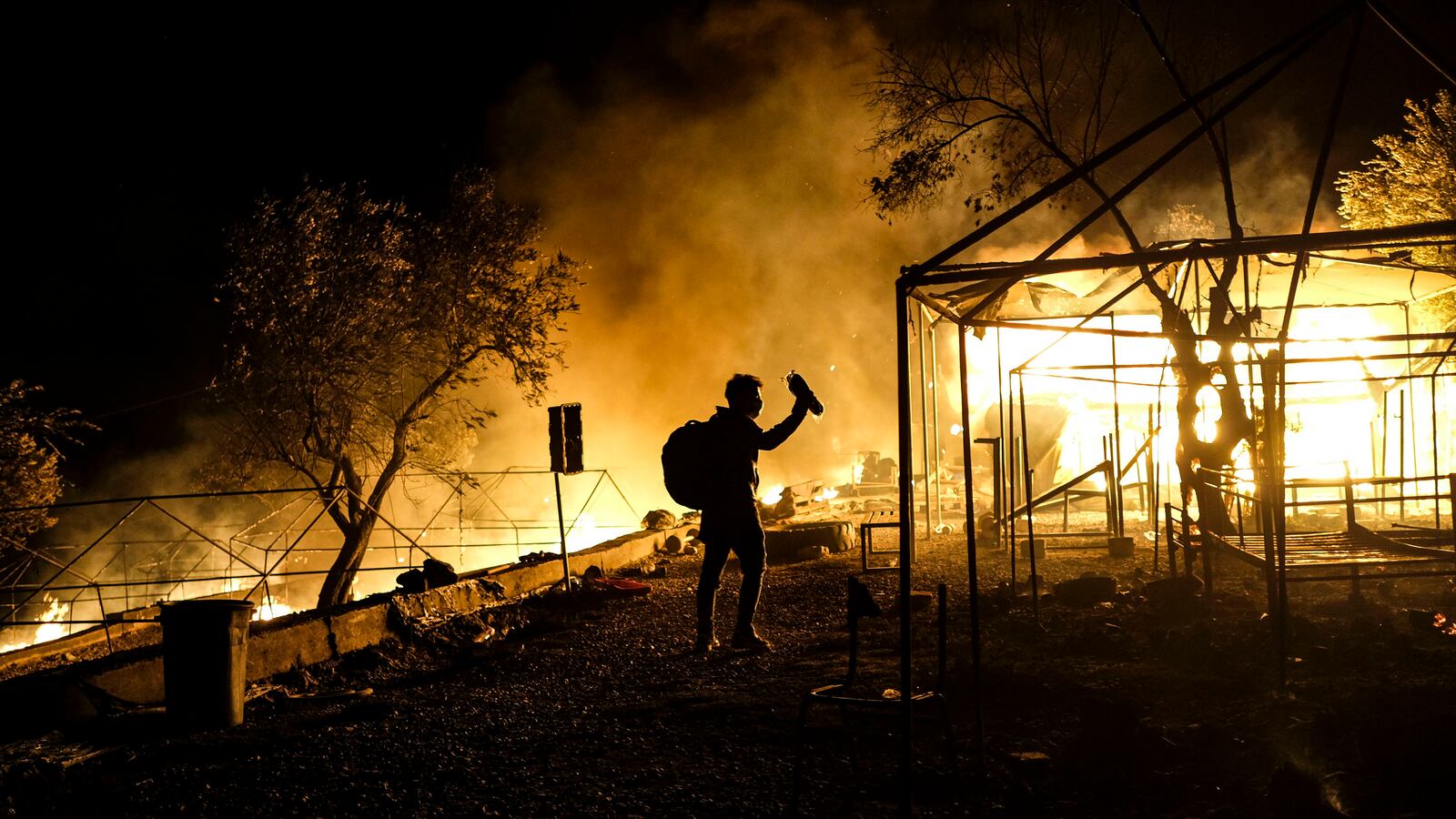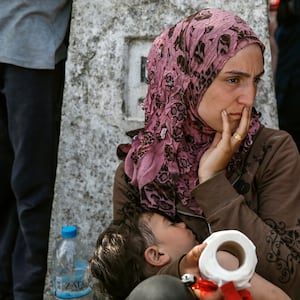LESBOS, Greece—A few days after the sprawling Moria refugee camp was destroyed in a September inferno last year, the Greek minister of civil protection announced that the “arsonists of Moria are being held.” At the same time, Faiz, an Afghan asylum-seeker who spoke to The Daily Beast using an alias, suddenly stopped hearing from his 17-year-old nephew.
He soon found out his nephew, who The Daily Beast is calling Adam, was one of six young Afghans, including two minors, who had been charged with setting Moria ablaze and leaving up to 13,000 migrants homeless and without possessions in the midst of a global pandemic. Known as the “the worst refugee camp on Earth,” the crowded Moria facility was completely demolished within two days after a series of fires—which began on Sept. 8—broke out in separate areas of the camp.
Facing immense public pressure, “a marathon to arrest those responsible” ensued, as one Greek tabloid put it. The Hellenic police set up a “special investigations team.” The Greek minister for citizen protection flew in to supervise. Even the secret service was involved. A week later, six young migrants, including Adam, were arrested.
At a juvenile court in Lesbos last month, Faiz tried to explain to a judge that his nephew was alone in the unaccompanied minors’ section of the camp when the fire started and had immediately run over to his uncle’s tent. But it was his word against the written testimony of an elusive witness who had allegedly given the police a list of names, including the name of Faiz’s nephew, claiming he saw them start the fire.
That witness never actually appeared in court. According to the Greek portal “Press Project,” he received asylum status immediately after speaking to the police in September. Adam’s lawyer, Vicky Aggelidou, was never given the opportunity to question the witness, and his current whereabouts are unknown to officials.
The Legal Centre Lesbos (LCL), an NGO that provides legal support to migrants and is representing the Moria 6, described the trial as a scandal” that “mocks the principles of a democratic state.” Greek police have previously coerced community leaders to turn over people for prosecution in the past, by threatening them with criminal charges and offering benefits like getting transferred from the island, according to LCL.
The man’s written declaration, which the court described as “particularly credible,” was the main evidence prosecutors had relied on to make their case against Adam. At the end of a six-hour closed-door trial, Adam and another young man, who we are calling Mehdi, were sentenced to five years in prison each for arson. Both were 17 years old at the time. Four other Afghans, all young adults, still await trial.
Unlike Adam and the other suspects, Mehdi ended up in court after two police officers claimed to have identified him in a shaky minute-long video lifted off of Facebook in September, which showed the back of a male individual holding pieces of cardboard to a fire. His full face is not visible at any point in the clip.
According to LCL, more than 10 people from the Hazara community showed up in front of the courthouse in Mytilini last month prepared to testify to Adam and Mehdi alibis on the night of the first fire. But the court limited the testimony to one witness per defendant.
“This was in the context of a very hostile environment, where most people are afraid to go to the authorities,” LCL lawyer Lorraine Leete told The Daily Beast. The trial, she adds, “is proof of the lack of any fair procedure that migrants face when they arrive in Lesbos, whether it’s criminal procedures or asylum procedures.”
Leete added that, in her opinion, the evidence used against the migrants appeared “consistent with a practice of arbitrarily arresting and prosecuting migrants,” especially when “police believe they are responsible for organizing protests.” On the day of the fire, there had been protests in the camp against lockdown measures, which the Greek government claimed the alleged arsonists had been involved in.
In 2018, an Iraqi community leader was reportedly coerced by police to name eight Syrian and Iraqi refugees after a peaceful protest against the conditions in the camp. After testifying, he was granted asylum, and later admitted in a video that he had been “under threat” and had given their names falsely, according to migrant advocacy groups.
Two police officers testified last month that they had identified Mehdi from a Sept. 10 Facebook video captioned: “This is a depiction that confirms that Afghan immigrants were the ones who torched the camp, that they spoke the Afghan language.”
The clip appears to show a male in an open field that is flaming with little fires. With his back turned to the camera, he speaks Farsi and spreads a few flames with a piece of cardboard. In the days that followed, the video was viewed 35,000 times. The Greek broadcaster Skai reported that, “one of the minors, as it appears from the materials of the authorities, seems to have, as the police put it, ‘burnt half of Moria.’”
In court, the two officers pointed to a photo of Mehdi wearing a similar outfit to the one worn by the person in the video: a pink shirt, sweatpants and slide sandals. Mass distribution of identical garments were common in the Moria camp, especially for minors, but The Daily Beast was not able to confirm whether the shirt or pants in the video had been ordered and distributed en masse before the fire.
According to LCL, one of the officers had described Mehdi as “tiny and short,” as the man in the video appears to be. But when Mehdi stands up, he appears visibly taller than the officer. According to Press Project, one officer also claimed to have identified Mehdi by his “haircut,” with Mehdi’s lawyer rebutting him by arguing that “90 percent” of young Afghan refugees don the same hairstyle.
The video first appeared on Arabic Facebook page “M.R.C” ( “rescue and follow up call”), which is dedicated to sharing information for refugees travelling from Turkey to Europe. It includes posts about scam operations, documented incidents with the Greek and Turkish coast guards, and migrants who have gone missing.
The page, which has around 100,000 followers, is run by a group of 10 volunteers, mostly based in Greece and Turkey. One of them goes by the nickname Alaa Al Iraqi. His mantra: “Don’t follow the news, follow Alaa Al Iraqi.”
"I thought I had to show who should feel bad [about the fire]. It’s not everyone in the camp—only certain communities,” Alaa told The Daily Beast. Asylum seekers in Lesbos come from countries like Afghanistan, Iraq, Syria, as well as African countries like the Democratic Republic of Congo and Somalia. The footage, Alaa says, was sent to him by a friend who'd lived in the Moria camp.
“I don’t care. Anything true, I put it on my page,” says Alaa.
Underneath the video, he’d written, “Everyone should share the video and post it in all groups to lift the injustice against immigrants who are not at fault.” His post was then shared by various Greek and German accounts, who left comments like “Send them back“ and “No more aid.“
“Some Greek people, they shared this video, they said. ‘Look at these animals, setting fire to their own houses,’” says Alaa. “I commented under their posts to say, you cannot take this video and talk like this. Nobody answered me.”
Alaa says that, after uploading the video, no police officer or other public official ever contacted him or “M.R.C” to ask any questions about it.
In October, after several high-ranking Greek politicians made statements about the “Moria arsonists,” the BBC released a documentary titled “Who started the fire at Europe’s largest refugee camp?,” which relied on footage taken by refugee journalists from ReFOCUS Media Labs, who had filmed the fire as it spread on Sept. 8 and 9.
Immediately after the BBC film aired, the ReFOCUS Media students got called in to Mytilini police station as potential witnesses. There, the officers demanded to know whether they had any footage of people, including local Greeks, starting fires. The student journalists told them that they didn’t have or know anyone who had video evidence of suspected arsonists. But the police were relentless, playing and pausing the documentary to interrogate them on different frames.
“It was actually quite shocking when they came at us in October. The way they treated everyone just felt like harassment,” says Douglas Herman, who helps run the media lab. “They kind of presented to the public that they had already closed their investigation very quickly, that within days of the fire, they already had it all solved.”
Shortly after the refugee camp had burned down, the Greek daily Ekathimerini reported that the “key testimony” for the arrest of the “Moria 6” was supplied by “a 42-year-old representative of the Afghan community” of the Moria camp, who “told police that a group of at least 15 young Afghans… had set the fire and named five of his compatriots to be arrested.”
In the Moria camp, the different nationality groups elect leaders to represent them at weekly meetings with the camp management and the police. At the time of September’s fire, there were around 9,000 people from Afghanistan living in the Moria camp.
“My nephew doesn’t know who the leader is, and the leader doesn’t know who my nephew is,” said Faiz, speaking from his rain-drenched fabric tent. The UNHCR had attempted to deliver new housing containers to migrants as a replacement to the homes lost in the fire, but the delivery was reportedly road-blocked by angry locals protesting the establishment of a new camp.
“From the evidence we’ve seen [the community leader] is the only witness who came forward to name people after the fire,” says Leete.“He gave five very common Hazara first names, not last names, then he was shown specific photographs by the police and he identified [the five defendants] from the few photos he was given.”
The photos shown were from the suspects’ registration papers: thumbnail-sized, blurry black and white portraits with hazy grey backgrounds. Adding to this, the community leader is from the Pashtun tribe and only provided names of individuals who are ethnically Hazara, which is a persecuted minority in Afghanistan.
A few days before Adam’s trial, Faiz had tried to visit his nephew in jail. “The police didn't let me talk to him. They told me even his parents cannot see him,” he told The Daily Beast. When Faiz saw his nephew in the courtroom, he was crushed. “He just looked wasted,” he said.
Among the migrant community in Greece, rumors are still swirling about the circumstances, potential victims, and alleged culprits behind the fire that uprooted the thousands of migrants who had been living in the camp. Several migrants told the BBC that “far-right Greeks” were responsible for starting the fire after news broke of the first reported COVID cases in the camp.
“I heard 10 different stories about what happened that night,” says Harbi, who came from Syria and organizes apartments for refugee families in the city. The day after the fire, Harbi brought food to a friend in the camp. She told him that she had heard of five people who had died in the fire, including “a girl and her mother, a baby from Congo and somebody from Somalia.”
The UNHCR said that no casualties were officially reported. But officials had never kept an exact count of how many migrants were living in the camp in the first place, and the fire brigade reportedly forwent an extensive forensic investigation of the charred grounds.
After the fire, the Greek government justified its refusal to evacuate tens of thousands of now-homeless asylum seekers from the island with the argument that, “Some [people] do not respect the country that is hosting them… they thought that if they set fire to Moria they would leave the island indiscriminately. Whatever those who set the fires had in mind, they can forget it.”
The prosecutor’s office in Lesbos declined to comment for this article, writing that, “according to our cοnstitution, the prosecutor never gives out information or interviews about any case which comes before him/her.”
Adam’s uncle says he is still reeling from the ordeal. “I thought it was going to be a fair court, but it wasn’t. I thought my nephew was going to be freed, because he didn’t do anything,” said Faiz.
“But he wasn’t.”


